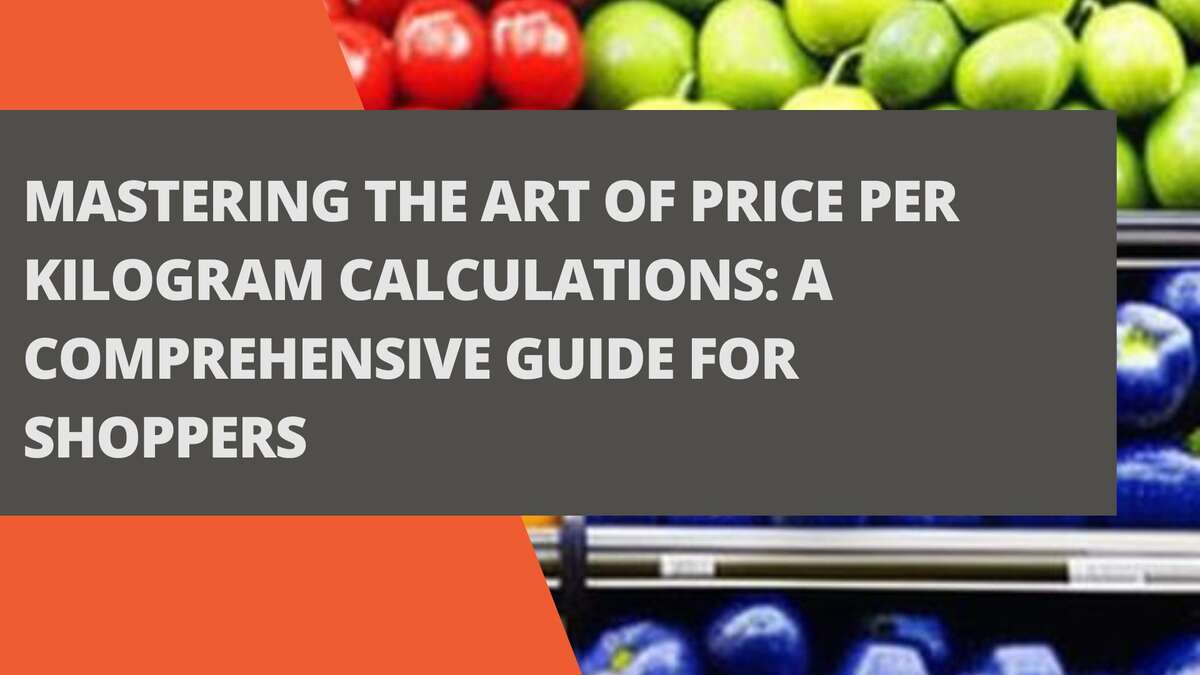Are you tired of overpaying for your groceries or struggling to make sense of the varying unit prices at the store? With the ever-increasing cost of living, it's more important than ever to become a smart shopper. One way to ensure you're getting the best value for your money is to master the art of price per kilogram calculations. In this comprehensive guide, we'll walk you through the process of calculating the price per kilogram, provide useful examples, and share some valuable tips and tricks. By the end of this post, you'll be a pro at comparing prices and making informed purchasing decisions. Let's dive in!
What are Price Per Kilogram Calculations?
Price per kilogram is a metric that compares the cost of an item based on its weight. This value is expressed in dollars per kilogram and is an essential tool for shoppers to make informed decisions when comparing products of different sizes and quantities. By calculating the price per kilogram of each item, you can easily identify the best value for your money.
How to Calculate Price Per Kilogram
Calculating the price per kilogram is a straightforward process that only requires two pieces of information: the total price per unit and the total weight per unit. Here's the formula for price per kilogram:
Price per kilogram = Total price per unit / Total weight per unit
Let's break down the formula further:
- Price per kilogram is the cost per one kilogram of the product, given in dollars.
- Total price per unit is the price you paid for the whole item or package.
- Total weight per unit is the weight of the entire item or package you purchased.
Price Per Kilogram Calculation Example
Now that we understand the formula let's look at a real-life example. Suppose you bought 3 kilograms of potatoes for $4.39, and you want to know the price per kilogram. Using the formula above, we can calculate the price per kilogram as follows:
Price per kilogram = Total price per unit / Total weight per unit
Price per kilogram = 4.39 / 3
Price per kilogram = 1.4633
Since prices are typically expressed with two decimal places, we round off the result:
Price per kilogram ≈ 1.46
So, the price per kilogram of potatoes is $1.46.
Calculating Price Per Kilogram Using Excel
Excel is a powerful tool that can help you calculate price per kilogram with ease. Let's use the same example as before, but this time we'll use Excel:
Price per kilogram = Total price per unit / Total weight per unit
Price per kilogram = 50.65 / 6
To round off the result, use the "ROUNDUP" or "ROUNDDOWN" functions in Excel:
Price per kilogram ≈ 8.44
With a simple Excel formula, you now know that the price per kilogram of laundry powder is $8.44.
Using Online Tools for Price Per Kilogram Calculations
If you prefer a more convenient solution for your price per kilogram calculations, you can use online tools like the Price Per Kilogram Calculator on our website. With this tool, all you need to do is enter the total price and total weight per unit, click the 'calculate' button, and the calculator will show you the price per kilogram instantly.
Tips and Tricks for Mastering Price Per Kilogram Calculations
Here are some valuable tips and tricks to help you master price per kilogram calculations and become a savvy shopper:
- Always compare prices per kilogram: When shopping, always compare the price per kilogram of similar products to ensure you're getting the best value for your money.
- Use technology: Take advantage of online tools, smartphone apps, or Excel to calculate price per kilogram quickly and accurately.
- Consider package size: Larger packages often offer better value per kilogram, but always calculate the price per kilogram to be sure.
- Factor in storage and shelf life: While buying in bulk can save you money, consider storage space and product shelf life to avoid waste.
- Stay informed: Keep track of your favorite products' prices and monitor sales and promotions to get the best deals.
Conclusion
Mastering the art of price per kilogram calculations is an essential skill for smart shoppers who want to make informed decisions and save money. By understanding the formula, using Excel or online tools, and following our tips and tricks, you can become a savvy shopper and maximize the value of your hard-earned money. Happy shopping!
